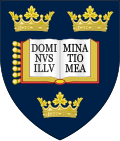 Official Logo of Oxford Odissi Centre | |
| Formation | 2015 |
|---|---|
| Headquarters | Oxford, United Kingdom |
| Location |
|
Region served | Worldwide |
Founder | Baisali Mohanty |
| Affiliations | University of Oxford |
The Oxford Odissi Centre is a non-sports society of the University of Oxford, United Kingdom. The centre aims to promote and educate about Odissi, one of the oldest Indian classical dances. [1] [2] [3]
Contents

Beside holding regular Odissi dance classes for members of University of Oxford, the centre undertakes numerous activities to promote Odissi and other Indian classical dance at the university. [4] [5] It also conducts Odissi dance workshops at other leading institutions including University of Cambridge, London School of Economics, University College London, King's College London, University of Manchester, and University of Edinburgh. [6]
The centre, in association with the High Commission of India to the United Kingdom, organizes the Oxford Odissi Festival, an annual festival of Indian classical dance at the University of Oxford. [7]


